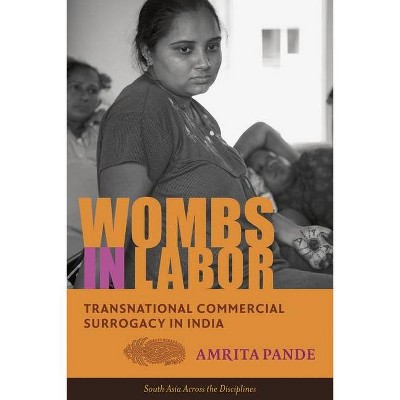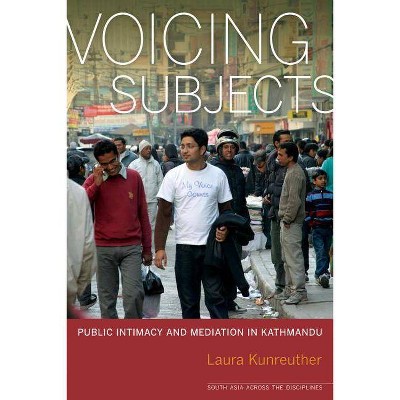Wombs in Labor - (South Asia Across the Disciplines) by Amrita Pande (Paperback)

Similar Products
Products of same category from the store
AllProduct info
<p/><br></br><p><b> About the Book </b></p></br></br><p>Clients from all over the world hire Indian women to bear their children for a fraction of the cost of surrogacy elsewhere with little to no government oversight or regulation. In the first detailed ethnography of India's surrogacy industry, Amrita Pande visits clinics, lives in surrogacy hostels, and speaks with surrogates, their families, clients, doctors, brokers, and hostel matrons to capture the full mechanics of this burgeoning business and the experiences of the laborers within it. From recruitment to training to delivery, Pande's research focuses on the intersection of production and reproduction and its reflection of India's larger labor regime. Yet her work also showcases the strategies surrogates deploy to retain control over their bodies and reproductive futures. Pande ultimately advocates for a better understanding of this complex labor market, envisioning an international model of fair-trade surrogacy founded on openness and transparency in all business, medical, and emotional exchanges.</p><p/><br></br><p><b> Book Synopsis </b></p></br></br><p>Surrogacy is India's new form of outsourcing, as couples from all over the world hire Indian women to bear their children for a fraction of the cost of surrogacy elsewhere with little to no government oversight or regulation. In the first detailed ethnography of India's surrogacy industry, Amrita Pande visits clinics and hostels and speaks with surrogates and their families, clients, doctors, brokers, and hostel matrons in order to shed light on this burgeoning business and the experiences of the laborers within it. From recruitment to training to delivery, Pande's research focuses on how reproduction meets production in surrogacy and how this reflects characteristics of India's larger labor system.</p> <p>Pande's interviews prove surrogates are more than victims of disciplinary power, and she examines the strategies they deploy to retain control over their bodies and reproductive futures. While some women are coerced into the business by their families, others negotiate with clients and their clinics to gain access to technologies and networks otherwise closed to them. As surrogates, the women Pande meets get to know and make the most of advanced medical discoveries. They traverse borders and straddle relationships that test the boundaries of race, class, religion, and nationality. Those who focus on the inherent inequalities of India's surrogacy industry believe the practice should be either banned or strictly regulated. Pande instead advocates for a better understanding of this complex labor market, envisioning an international model of fair-trade surrogacy founded on openness and transparency in all business, medical, and emotional exchanges.</p><p/><br></br><p><b> Review Quotes </b></p></br></br><br><i>Wombs in Labor </i>is a valuable and timely contribution to the steadily increasing scholarship on assisted reproductive technologies and is a fascinating addition to the anthropology of work.--Anthropology of Work Review<br><br><i>Wombs in Labor</i> is an absorbing and meticulously researched work. Amrita Pande fruitfully scrutinises the minutiae of interactions among surrogates and the community of a clinic for their underlying meaning... recommended to anyone interested in the subject of surrogacy and will please all readers.--LSE Review of Books<br><br>A theoretically sophisticated and nuanced ethnography of interest to scholars in South Asian studies, women's studies, reproductive health, and labor studies.--Choice<br><br>At times heart-wrenching, Pande's ethnographic research provides a detailed and empathetic look at the business of India's surrogacy industry...--Journal of International Womens Studies<br><br>a fascinating look at the world of the Indian surrogate and the choice she makes in an effort to better her and her family's economic status.--Sarah Thomas "Journal of International Women's Studies "<br><br>an excellent contribution to undergraduate or graduate classes on globalization, reproduction, gender, or work.--Anna Curtis "Gender and Society "<br><br>Wombs in Labor is an important book that sheds light on the workings of transnational commercial surrogacy in India.... This book is a valuable read for anyone interested in commercial surrogacy, global inequality and women's labor.--Koh Sin Yee "Asian Review of Books "<br><br>Wombs in Labor is foundational.--Rajani Bhatia "Womens Review of Books "<br><p/><br></br><p><b> About the Author </b></p></br></br>Amrita Pande is a senior lecturer in sociology at the University of Cape Town. Her research focuses on the intersection of new technologies and reproductive labor, and her writings have appeared in <i>Signs: Journal of Women in Culture and Society</i>, <i>Gender and Society</i>, <i>Critical Social Policy</i>, <i>International Migration Review</i>, <i>Qualitative Sociology</i>, <i> Feminist Studies</i>, the <i>Indian Journal of Gender Studies</i>, <i>Reproductive BioMedicine</i>, and in several edited volumes. She is also an educator-performer and is currently involved in a multimedia theater performance, <i>Made in India: Notes from a Baby Farm</i>, which is based on her ethnographic work on surrogacy.
Price History
Price Archive shows prices from various stores, lets you see history and find the cheapest. There is no actual sale on the website. For all support, inquiry and suggestion messagescommunication@pricearchive.us




















